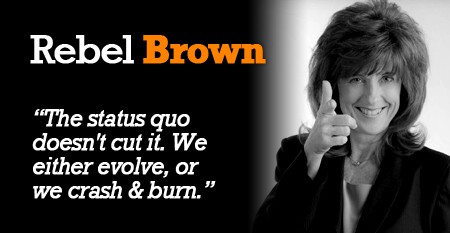Leadership without influence – isn’t. In fact, understanding how to leverage the influence factor can make a defining difference in your ability to drive change, build cohesive teams, and successfully implement the strategic vision.
As a CEO or entrepreneur your “Influence Quotient” is the IQ you need to pay attention to, as it will be a much greater determinant of your ultimate success than your “Intelligence Quotient” could ever be. Innate, raw intelligence while certainly something to be prized, is much more common and much less powerful than real influence. In today’s post, I’ll examine the often misunderstood value of influence.
Let me be clear; when I mention influence I’m not referring to manipulation, elaborate schemes, or other forms of skulduggery. Ill-gotten gains will always be exposed for what they are, and moreover, they will never be worth the compromises that were made in order to achieve them. Not only is true influence much easier to acquire, but it is also sustainable. Put simply, true influence is nothing more than understanding how to work with and through others to achieve a stated objective while staying true to your core values and maintaining your integrity.
The following fundamental concepts of influence, which if properly understood and implemented, can help anyone become more efficient, productive, and successful:
1. Influence is built upon a foundation of trust: If a person is not trusted there is a firm limit on their ability to create and use influence. People will rarely make a leap of faith for someone who hasn’t earned their trust. However, most people will gladly take a blind leap of faith for someone whom they have come to trust. Trust Matters….
2. Influence is built upon making others successful: This is oftentimes referred to as the law of reciprocity – if you invest yourself in making someone else successful then they, in turn, will likely be predisposed to helping you become successful. I prefer to think of it as a service. Care for the interests of those you lead and they’ll care for your interests. While this principle will not always pan out, in my experience it has held true across the overwhelming majority of my interactions through the years. True influence is rarely built upon the backs of others, but rather by serving others and helping them achieve their goals.
[Tweet “if you invest yourself in making someone else succeed then they, in turn, will likely be predisposed to helping you become successful.”]3. Likability: People do business with people they like, and avoid doing business with people they don’t like – it’s just that simple. Are you approachable, positive, affable, trustworthy, a person of character and integrity, or are you someone who is standoffish, pessimistic, and generally not to be trusted? Those the fall into the camp of the former, as opposed to the latter, will find themselves having more influence and success. Let me be blunt – don’t be a jerk.
4. Influence is wielded through helping others maintain commitments: Professionals respect other professionals who keep their commitments. In the business world, you are most often judged on your ability to keep your word and deliver on your promises. The key behind influencing people via commitment lies in your ability to have people adopt an initial position that is consistent with a behavior, such that they are willing to agree to requests that are consistent with their prior commitment. People desire to be perceived as dependable, reliable, and successful, and will normally go to great lengths not to have their track-record or reputation tarnished. Gain strong commitments early on, and then simply hold people to their commitments. This ultimately helps them enhance their reputation for delivering on promises made.
5. Influence is most often possessed by those with authority: It is important to realize that there is a reason for the statement “the highest authority is that which is given, and rarely that which is taken.” Authority is most often given to those that display honesty, competency, expertise, and wisdom. With authority comes credibility, and with credibility comes influence. While influence can be wielded by those without authority, it will be limited in both scope and scale. Those with the most authority will always have the most influence.
6. Value and scarcity drive influence – to a point: Understanding the value of your position, brand, authority, resources, access to people or knowledge, and any number of other items as it relates to fulfilling the needs and desires of others creates influence. To the extent, anything under your charge is scarce or proprietary your ability to create influence will increase significantly. However, it is important to note you can cross over to the dark side and actually lose influence if you attempt to hoard scarce resources as opposed to sharing them. The creation of silos, having a protectionist mentality, or simply not being willing to share knowledge is more about control and power than leadership – it undermines your ability to use influence in a positive light.
Bottom line…Don’t manipulate for personal gain, rather facilitate for mutual benefit. Take a sincere interest in the success of others, work on your likability factor, become adept at gaining commitment, develop your authority, and have access to things of value or scarcity, and your influence with others will increase.







